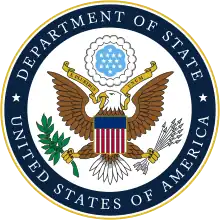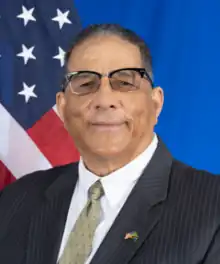| Ambassador of the United States to Tanzania | |
|---|---|
 Seal of the United States Department of State | |
| Nominator | President of the United States |
| Inaugural holder | William Leonhart as Ambassador Extraordinary and Plenipotentiary |
| Formation | August 22, 1962 |
| Website | U.S. Embassy - Dar es Salaam |
The present country of Tanzania, officially the United Republic of Tanzania, was created upon the union of the formerly independent countries of Tanganyika and the People's Republic of Zanzibar (P.R.Z.).
Tanganyika became independent from the United Kingdom (U.K.) on December 9, 1961. The United States (U.S.) immediately recognized the new nation and moved to establish diplomatic relations. The U.S. embassy in Dar es Salaam opened on the day of Tanganyika's independence. William R. Duggan served as the chargé d'affaires ad interim pending the appointment of an ambassador.
The Sultanate of Zanzibar became independent from the U.K. on December 19, 1963, as a constitutional monarchy headed by its sultan. The U.S. established an embassy in Zanzibar on December 10, 1963, with Frederick P. Picard III serving as chargé d'affaires ad interim. In January 1964, the sultan was overthrown and the P.R.Z. was established.
On April 26, 1964, Tanganyika united with the P.R.Z. to form the United Republic of Tanganyika and Zanzibar (U.R.T.Z.). The U.S. ambassador to Tanganyika, William Leonhart, immediately became the ambassador to the U.R.T.Z. A U.S. ambassador to the P.R.Z. had not yet been appointed when that country united with Tanganyika. In lieu of an ambassador, Frank C. Carlucci III was serving as the chargé d'affaires ad interim and continued in that capacity until the U.S. embassy was downgraded to a consulate general on June 27, 1964.
The country was renamed the United Republic of Tanzania on October 29, 1964.
The U.S. did not have an ambassador to Tanzania from October 2016 to August 2020.[1]
Ambassadors
|
U.S. diplomatic terms |
|---|
|
Career FSO After 1915, The United States Department of State began classifying ambassadors as career Foreign Service Officers (FSOs) for those who have served in the Foreign Service for a specified amount of time. Political appointee A person who is not a career foreign service officer, but is appointed by the president (often as a reward to political friends). Appointed The date that the ambassador took the oath of office; also known as "commissioning". It follows confirmation of a presidential appointment by the Senate, or a Congressional recess appointment by the president. In the case of a recess appointment, the ambassador requires subsequent confirmation by the Senate to remain in office. Presented credentials The date that the ambassador presented his letter of credence to the head of state or appropriate authority of the receiving nation. At this time the ambassador officially becomes the representative of his country. This would normally occur a short time after the ambassador's arrival on station. The host nation may reject the ambassador by not receiving the ambassador's letter, but this occurs only rarely. Terminated mission Usually the date that the ambassador left the country. In some cases a letter of recall is presented, ending the ambassador's commission, either as a means of diplomatic protest or because the diplomat is being reassigned elsewhere and replaced by another envoy. Chargé d'affaires The person in charge of the business of the embassy when there is no ambassador commissioned to the host country. Ad interim Latin phrase meaning "for the time being", "in the meantime". |
| Name | Title | Appointed | Presented credentials | Terminated mission | Notes |
|---|---|---|---|---|---|
| William Leonhart – Career FSO | Ambassador Extraordinary and Plenipotentiary | August 22, 1962 | October 3, 1962 | December 22, 1965 | Leonhart was originally commissioned to Tanganyika. He was recommissioned when Tanganyika became a republic and presented new credentials on December 17, 1962. Leonhart continued to serve without further reaccreditation after the formation of the United Republic of Tanganyika and Zanzibar |
| John H. Burns – Career FSO | September 24, 1965 | January 3, 1966 | June 22, 1969 | ||
| Claude G. Ross – Career FSO | October 9, 1969 | December 27, 1969 | June 25, 1972 | ||
| W. Beverly Carter, Jr. – Career FSO | June 27, 1972 | July 24, 1972 | October 14, 1975 | ||
| James W. Spain – Career FSO | November 20, 1975 | January 8, 1976 | August 21, 1979 | ||
| Richard Noyes Viets – Career FSO | September 28, 1979 | October 18, 1979 | May 16, 1981 | ||
| David Charles Miller, Jr. – Political appointee | October 26, 1981 | November 4, 1981 | February 28, 1984 | ||
| John William Shirley – Career FSO | June 28, 1984 | July 28, 1984 | July 18, 1986 | ||
| Donald K. Petterson – Career FSO | October 16, 1986 | December 8, 1986 | December 26, 1989 | ||
| Edmund DeJarnette, Jr. – Career FSO | November 21, 1989 | February 26, 1990 | September 12, 1992 | ||
| Peter Jon de Vos – Career FSO | June 15, 1992 | January 8, 1993 | June 3, 1994 | ||
| J. Brady Anderson – Political appointee | August 26, 1994 | September 13, 1994 | October 7, 1997 | ||
| Charles Richard Stith – Political appointee | June 29, 1998 | September 17, 1998 | January 20, 2001 | ||
| Robert V. Royall – Political appointee | November 5, 2001 | December 19, 2001 | November 21, 2003 | The post was vacant from November 2003 until August 2005. Michael S. Owen served as chargé d'affaires ad interim during that time. | |
| Michael Retzer – Political appointee | August 24, 2005 | March 9, 2005 | August 31, 2007 | ||
| Mark Andrew Green – Political appointee | August 23, 2007 | September 13, 2007 | January 20, 2009 | ||
| Alfonso E. Lenhardt – Political appointee | November 12, 2009 | November 12, 2009 | October 9, 2013 | ||
| Mark B. Childress – Political appointee | April 7, 2014 | May 22, 2014 | October 25, 2016 | ||
| Donald J. Wright – Political appointee | February 14, 2020 | August 2, 2020 | January 11, 2023 | ||
| Michael Battle - Political appointee | December 13, 2022 | February 27, 2023 | Incumbent |
See also
Notes
- ↑ "Previous Ambassadors". U.S. Embassy in Tanzania. Retrieved July 25, 2018.
